- Home
- Alan Bennett
Alan Bennett: Plays, Volume 2
Alan Bennett: Plays, Volume 2 Read online
ALAN BENNETT
Plays Two
Kafka’s Dick
The Insurance Man
The Old Country
An Englishman Abroad
A Question of Attribution
Introduced by the author
Contents
Introduction
1 On Kafka’s Dick and The Insurance Man
2 On An Englishman Abroad and A Question of Attribution
KAFKA'S DICK
Introduction
THE INSURANCE MAN
Diary: July–August 1985
THE OLD COUNTRY
AN ENGLISHMAN ABROAD
A QUESTION OF ATTRIBUTION
Introduction
I On Kafka’s Dick and The Insurance Man
I have written two plays around if not altogether about Kafka and in the process have accumulated a good deal of material about and around the Prague insurance man. Some of this is fanciful; sketches and speculations that never had a hope of being included in either piece; some of it is the kind of stuff that’s always left over after writing a play, the speeches one has not managed to get in or the jokes that have had to be cut out and which are invariably the jokes and the speeches of which the playwright is most fond. Indeed he often thinks them the heart of the play, whereas the director (who never had to sweat over them) can see they’re diversions, distractions or ornament. Not wanted on voyage. There is a word for this kind of thing which I have just come across (and having come across it can’t think how I’ve managed so long without it); it is paralipomena – the things omitted but which appertain and are put in later as afterthoughts. It describes half my life as well as the notes that follow.
Besides these notes I have also included, as an introduction to The Insurance Man, a diary that I kept during the shooting of the film, which was first shown on BBC2 in February 1986. Kafka’s Dick was produced at the Royal Court Theatre six months later. The play was not as well received by the critics as was the film and, though I could not imagine it better done and it played to packed houses, it did not transfer for a longer run. Shortly after it opened, I was working in Yugoslavia and drove into Italy for the day. Depressed about the reception the play had had I came by chance on the village of Aquileia, went to look at the church and found there a huge mosaic floor laid down in the fourth century. I say ‘by chance’ but to read Kafka is to become aware of coincidence. This is to put it at its mildest. His work prefigures the future, often in ways that are both specific and dreadful and this is part of his popular reputation. Sometimes though, his premonitions are less haunted, lighthearted even: he has a notion of the answering machine, for instance, and a dream of Berlin divided by a wall that seems more strange than tragic. In Kafka’s Dick, Kafka is metamorphosed from a tortoise and is also sensitive about the size of his cock. So to find inside the west door of this church at Aquileia, a mosaic of a cock fighting a tortoise seemed not quite an accident. In the play cock and tortoise are not symbols; in Aquileia, so said the guide book, they represent a battle between the forces of light and darkness. I bought a postcard of the mosaic and the postcard-seller told me of a better example in the crypt. This took some finding, as the tortoise wasn’t so much in the crypt as in a crypt beyond the crypt, and even there hidden behind the furthest pillar, just where Kafka (were he a tortoise) would have chosen to be. This seemed if not quite a nod then at least a wink and I drove on in better spirits.
I would like to thank Richard Eyre, who directed the plays and the film (and who was always in good spirits) and for her unstinting help and encouragement, the best of editors, Mary-Kay Wilmers.
A.B., 1987
2 On An Englishman Abroad and A Question of Attribution
Some years ago a stage play of mine, The Old Country, was running in the West End. The central character, Hilary, played by Alec Guinness, was a Foreign Office defector living in Russia. Hilary was generally identified as Philby, though that had not been my intention, the character having much more in common with a different sort of exile, W. H. Auden. However during the run of The Old Country friends and well-wishers would come round after the performance, often with reminiscences of Philby and his predecessors, Burgess and Maclean. One of these was Coral Browne who told me of her visit to Russia with the Shakespeare Memorial Theatre in 1958 and the particular incidents that make up An Englishman Abroad.
The picture of the elegant actress and the seedy exile sitting in a dingy Moscow flat through a long afternoon listening again and again to Jack Buchanan singing ‘Who stole my heart away?’ seemed to me funny and sad but it was a few years before I got round to writing it up. It was only when I sent Coral Browne the first draft of the television film that I found she had kept not merely Burgess’s letters, thanking her for running his errands, but also her original notes of his measurements and even his cheque (uncashed and for £6) to treat her and one of her fellow actors to lunch at the Caprice. The original script of the television film was quite close to the version now presented on the stage. It had no exterior shots because I knew no BBC budget would run to filming in Moscow or some foreign substitute. I introduced the exteriors only when a suitable (and a suitably economic) substitute for Moscow was found in Dundee.
I have put some of my own sentiments into Burgess’s mouth. ‘I can say I love London. I can say I love England. I can’t say I love my country, because I don’t know what that means’, is a fair statement of my own, and I imagine many people’s position. The Falklands War helped me to understand how a fastidious stepping-aside from patriotism could be an element in characters as different as Blunt and Burgess. Certainly in the spy fever that followed the unmasking of Professor Blunt I felt more sympathy with the hunted than the hunters.
I never met Blunt, but though he seems to have been an altogether less likeable character than Burgess he is a more familiar type, at any rate in academic circles. Championed by his pupils, he was less favourably regarded by some of his colleagues, who found him arrogant and opinionated. There are plenty of dons like this, in whom shyness, self- assurance and deep conviction combine to give an uncongenial impression. Housman and Wittgenstein are perhaps the most distinguished examples. In death such characters are invariably filed under the obituarist’s catch- all ‘Did not suffer fools gladly’.
In the first play it is suggested that Burgess was a spy because he wanted a place where he was alone, and that having a secret supplies this. I believe this to be psychologically true, but there is a sense too that an ironic attitude towards one’s country and a scepticism about one’s heritage is a part of that heritage. And so, by extension, is the decision to betray it. It is irony activated.
I find it hard to drum up any patriotic indignation over either Burgess or Blunt, or even Philby. No one has ever shown that Burgess did much harm, except to make fools of people in high places. Because he made jokes, scenes and, most of all, passes, the general consensus is that he was rather silly. Blunt was not silly and there have been attempts to show that his activities had more far-reaching consequences, but again he seems to be condemned as much out of pique and because he fooled the Establishment as for anything that he did. It is Philby who is always thought to be the most congenial figure.
Clubbable, able to hold his liquor, a good man in a tight corner, he commends himself to his fellow journalists, who have given him a good press. But of all the Cambridge spies he is the only one of whom it can be proved without doubt that he handed over agents to torture and death.
It suits governments to make treachery the crime of crimes, but the world is smaller than it was and to conceal information can be as culpable as to betray it. As I write evidence is emerging of a nuclear accident at Windscale in 1957, the full ex
tent of which was hidden from the public. Were the politicians and civil servants responsible for this less culpable than our Cambridge villains? Because for the spies it can at least be said that they were risking their own skins whereas the politicians were risking someone else’s.
Of course Blunt and Burgess and co. had the advantage of us in that they still had illusions. They had somewhere to turn. The trouble with treachery nowadays is that if one does want to betray one’s country there is no one satisfactory to betray it to. If there were, more people would be doing it.
A.B., 1989
KAFKA’S DICK
Introduction
There are many perils in writing about Kafka. His work has been garrisoned by armies of critics with some 15,000 books about him at the last count. As there is a Fortress Freud so is there a Fortress Kafka, Kafka his own castle. For admission a certain high seriousness must be deemed essential and I am not sure I have it. One is nervous about presuming even to write his name, wanting to beg pardon for doing so, if only because Kafka was so reluctant to write his name himself. Like the Hebrew name of God it is a name that should not be spoken, particularly by an Englishman. In his dreams Kafka once met an Englishman. He was in a good grey flannel suit, the flannel also covering his face. Short of indicating a prudent change of tailor the incident (if dreams have incidents) serves to point up the temptation to English Kafka and joke him down to size. The Channel is a slipper bath of irony through which we pass these serious continentals in order not to be infected by their gloom. This propensity I am sure I have not escaped or tried to; but then there is something that is English about Kafka, and it is not only his self-deprecation. A vegetarian and fond of the sun, he seems a familiar crank; if he’d been living in England at the turn of the century and not in Prague one can imagine him going out hiking and spending evenings with like- minded friends in Letchworth. He is the young man in a Shaw play who strolls past the garden fence in too large shorts to be accosted by some brisk Shavian young woman who, perceiving his charm, takes him in hand, puts paid to his morbid thoughts and makes him pull his socks up.
Charm he certainly had, but not at home. Chewing every mouthful umpteen times so that at meals his father cowered behind the newspaper, Kafka saved his charm for work and for his friends. Home is not the place for charm anyway. We do not look for it around the fireside so it’s not so surprising Kafka had no charm for his father. His father, it seems, had none for anybody. There is something called Home Charm though. In the forties it was a kind of distemper and nowadays it’s a chain of DIY shops. In that department certainly Kafka did not excel. He was not someone you would ask to help put up a shelf for instance, though one component of his charm was an exaggerated appreciation of people who could, and of commonplace accomplishments generally. Far from being clumsy himself (he had something of the dancer about him) he would marvel (or profess to marvel) at the ease with which other people managed to negotiate the world. This kind of professed incompetence (‘Silly me!’) often leads to offers of help and carried to extremes it encourages the formation of unofficial protection societies. Thus Kafka was much cosseted by the ladies in his office and in the same way the pupils of another candidate for secular sainthood, the French philosopher Simone Weil, saw to it that their adored teacher did not suffer the consequences of a practical unwisdom even more hopeless than Kafka’s.
One cannot say that Kafka’s marvelling at mundane accomplishments was not genuine, was a ploy. The snag is that when the person doing the marvelling goes on to do great things this can leave those with the commonplace accomplishments feeling a little flat. Say such a person goes on to win the Nobel Prize it is scant consolation to know that one can change a three-pin plug.
Gorky said that in Chekhov’s presence everyone felt a desire to be simpler, more truthful and more oneself. Kafka too had this effect. On his entrance into a room’, wrote a contemporary, ‘it seemed as though some unseen attendant had whispered to the lecturer, “Be careful about everything you say from now on. Franz Kafka has just arrived”’ To have this effect on people is a not unmixed blessing. When we are on our best behaviour we are not always at our best.
This is not to say that Kafka did not make jokes in life and in art. The Trial, for instance, is a funnier book than it has got credit for and Kafka’s jokes about himself are better for the desperate circumstances in which they were often made. He never did win the Nobel Prize of course, but contemplated the possibility once in fun and in pain, and in a fairly restricted category (though one he could have shared with several contemporaries, Proust, Katherine Mansfield and D. H. Lawrence among them). When he was dying of TB of the larynx he was fetching up a good deal of phlegm. ‘I think,’ he said (and the joke is more poignant for being so physically painful to make), ‘I think I deserve the Nobel Prize for sputum.’ Nothing if not sick, it is a joke that could have been made yesterday.
Dead sixty-odd years Kafka is still modern and there is much in the present day world to interest him. These days Kafka would be intrigued by the battery farm and specifically, with an interest both morbid and lively, in the device that de-beaks the still-living chickens; in waste- disposal trucks that chew the rubbish before swallowing it and those dubious restaurants that install for your dining pleasure a tank of doomed trout. As the maître d’ assists the discerning diner in the ceremony of choice, be aware of the waiter who wields the net: both mourner and executioner, he is Kafka. He notes old people in Zimmer frames stood in their portable dock on perambulatory trial for their lives. He is interested in the feelings of the squash ball and the champagne bottle that launches the ship. In a football match his sympathy is not with either of the teams but with the ball, or, in a match ending nil-nil, with the hunger of the goalmouth. He would be unable to endorse the words of the song by Simon and Garfunkel ‘I’d rather be a hammer than a nail’, feeling himself (as he confessed to one of his girlfriends) simultaneously both. And in a different context he would be concerned with the current debate on the disposal of nuclear waste. To be placed in a lead canister which is then encased in concrete and sunk fathoms deep to the floor of the ocean was the degree of circulation he thought appropriate for most of his writing. Or not, of course.
Kafka was fond of the cinema and there are short stories, like Tales of a Red Indian that have a feeling of the early movies. He died before the talkies came in and so before the Marx Brothers but there is an exchange in Horse Feathers that sums up Kafka’s relations with his father:
Beppo Dad, I’m proud to be your son.
Groucho Son, you took the words out of my mouth. I’m ashamed to be your father.
The Kafka household could have been the setting for many Jewish jokes:
Father Son, you hate me.
Son Father, I love you.
Mother Don’t contradict your father.
Had Kafka the father emigrated to America as so many of his contemporaries did, things might have turned out differently for Kafka the son. He was always stage-struck. Happily lugubrious, he might have turned out a stand-up Jewish comic. Kafka at Las Vegas.
Why didn’t Kafka stutter? The bullying father, the nervous son – life in the Kafka household seems a blueprint for a speech impediment. In a sense, of course, he did stutter.
Jerky, extruded with great force and the product of tremendous effort, everything Kafka wrote is a kind of stutter. Stutterers devise elaborate routines to avoid or to ambush and take by surprise troublesome consonants of which Κ is one of the most difficult. It’s a good job Kafka didn’t stutter. With two Ks he might have got started on his name and never seen the end of it. As it is he docks it, curtails it, leaves its end behind much as lizards do when something gets hold of their tail.
In thus de-nominating himself Kafka was to make his name and his letter memorable. Diminishing it he augmented it and not merely for posterity. Κ was a significant letter in his own time. There were Ks on every banner, palace and official form. Kafka had two Ks and so in the Kaiserlich and Königl
ich of the Habsburg Emperors, did the Austro- Hungarian Empire. The Emperor at the time was Franz Joseph and that comes into it too, for here is Franz Κ writing about Joseph Κ in the time of Franz Joseph K.
There was another emperor nearer at hand, the emperor in the armchair, Kafka’s phrase for his father. Hermann Kafka has had such a consistently bad press that it’s hard not to feel a sneaking sympathy for him as for all the Parents of Art. They never get it right. They bring up a child badly and he turns out a writer, posterity never forgives them – though without that unfortunate upbringing the writer might never have written a word. They bring up a child well and he never does write a word. Do it right and posterity never hears about the parents; do it wrong and posterity never hears about anything else.
‘They fuck you up your Mum and Dad’ and if you’re planning on writing that’s probably a good thing. But if you are planning on writing and they haven’t fucked you up, well, you’ve got nothing to go on, so then they’ve fucked you up good and proper.
Many parents, one imagines, would echo the words of Madame Weil, the mother of Simone Weil, a child every bit as trying as Kafka must have been. Questioned about her pride in the posthumous fame of her ascetic daughter Madame Weil said, ‘Oh! How much I would have preferred her to have been happy.’ Like Kafka Simone Weil is often nominated for secular sainthood. I’m not sure. Talk of a saint in the family and there’s generally one around if not quite where one’s looking. One thinks of Mrs Muggeridge and in the Weil family it is not Simone so much as her mother who consistently behaves well and elicits sympathy. In the Kafka household the halo goes to Kafka’s sister Ottla, who has to mediate between father and son, a role in weaker planetary systems than that revolving round Hermann Kafka which is more often played by the mother.

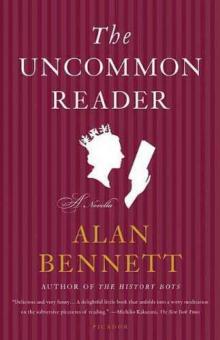 The Uncommon Reader: A Novella
The Uncommon Reader: A Novella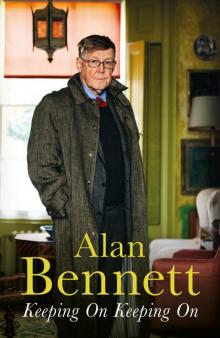 Keeping On Keeping On
Keeping On Keeping On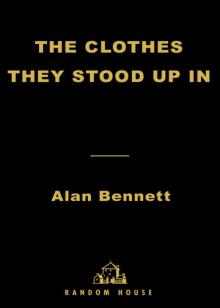 The Clothes They Stood Up In
The Clothes They Stood Up In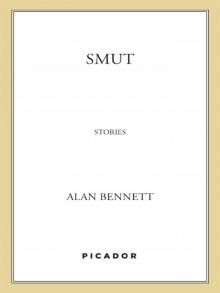 Smut: Stories
Smut: Stories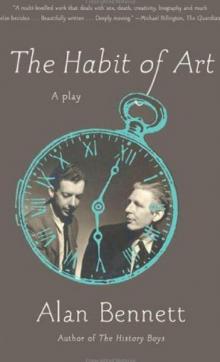 The Habit of Art: A Play
The Habit of Art: A Play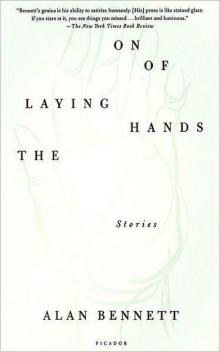 The Laying on of Hands: Stories
The Laying on of Hands: Stories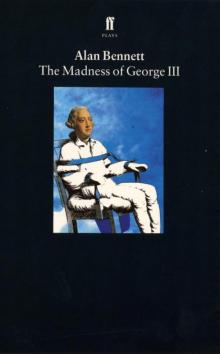 The Madness of George III
The Madness of George III Writing Home
Writing Home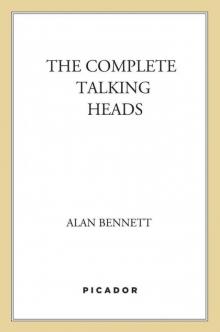 The Complete Talking Heads
The Complete Talking Heads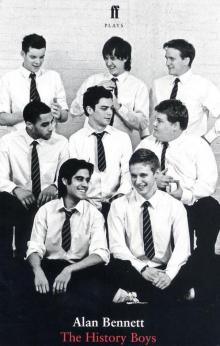 The History Boys
The History Boys Lady in the Van
Lady in the Van The Lady in the Van
The Lady in the Van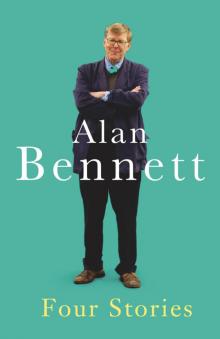 Four Stories
Four Stories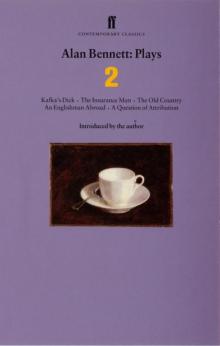 Alan Bennett: Plays, Volume 2
Alan Bennett: Plays, Volume 2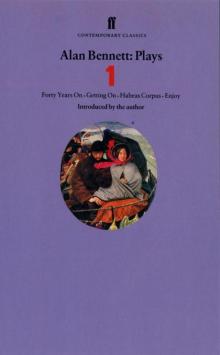 Alan Bennett: Plays, Volume 1
Alan Bennett: Plays, Volume 1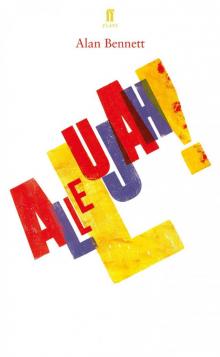 Allelujah!
Allelujah!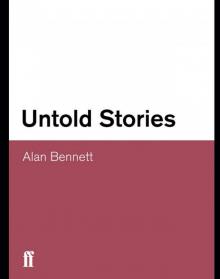 Untold Stories
Untold Stories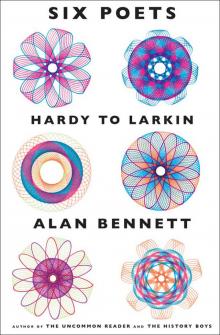 Six Poets
Six Poets